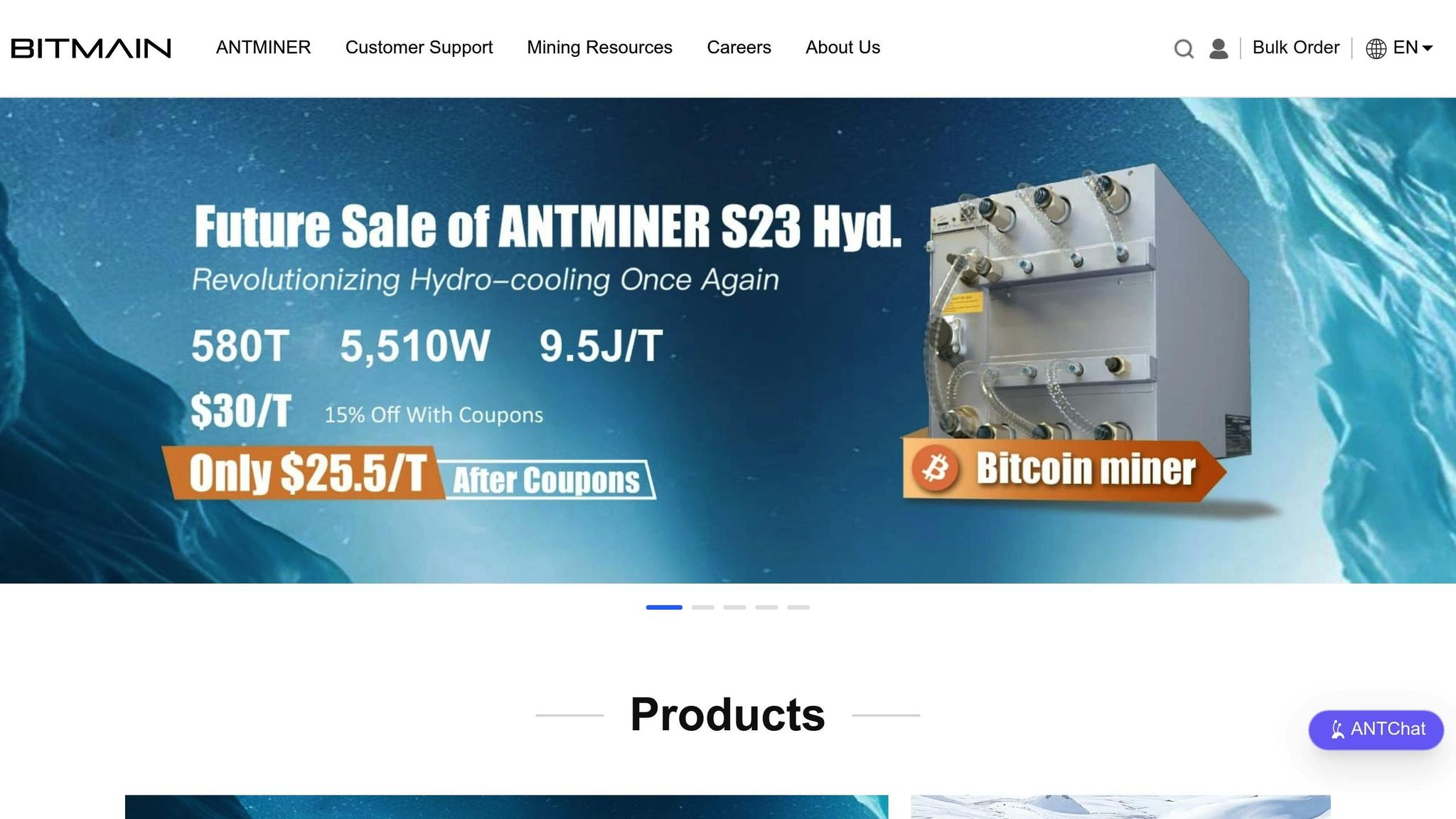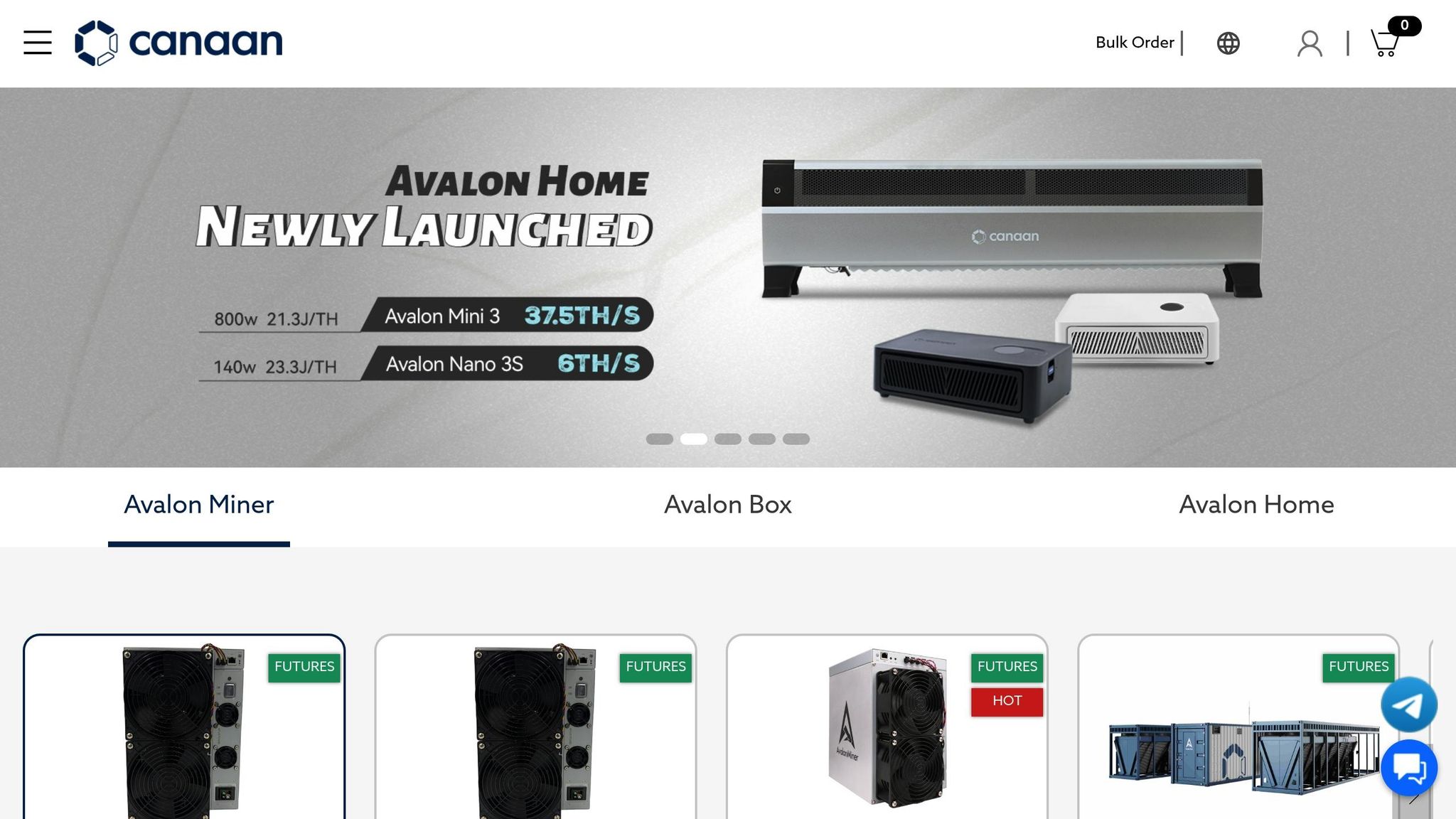Bitcoin mining has become highly competitive, and ASICs (Application-Specific Integrated Circuits) are now essential for profitability. These chips are designed specifically for Bitcoin's SHA-256 algorithm, offering better performance and energy efficiency than GPUs or CPUs. Three major companies dominate the ASIC market:
- Bitmain: Known for its Antminer series, Bitmain leads in high-performance ASICs for industrial-scale mining.
- MicroBT: Competes with reliable, energy-efficient miners like the WhatsMiner series, appealing to both mid- and large-scale operations.
- Canaan: Focuses on user-friendly products, offering options for both small-scale miners and large farms, with an emphasis on reducing power consumption.
Emerging manufacturers are also entering the scene, targeting smaller operations with flexible and efficient designs. Choosing the right ASIC depends on factors like electricity costs, hash rate, and budget.
Quick Comparison:
| Manufacturer | Target Audience | Notable Products | Energy Efficiency (J/TH) | Hash Rate |
|---|---|---|---|---|
| Bitmain | Large-scale miners | Antminer S21 XP, S21 Pro | 13.5 | Up to 270 TH/s |
| MicroBT | Mid- to large-scale | WhatsMiner series | Low (varies by model) | Consistent |
| Canaan | Small- to large-scale | Avalon A16XP-300T | 12.8 | Up to 300 TH/s |
Each company serves different needs, from industrial farms to hobbyist miners. The key is aligning your setup with the right hardware for maximum efficiency and profitability.
ASIC Mining Into The Bull Run - What's The Best Miner To Buy?
1. Bitmain

Bitmain Technologies stands out as one of the most prominent manufacturers of Bitcoin mining ASICs. Established in 2013 by Jihan Wu and Micree Zhan in Beijing, the company has gained recognition for its widely popular Antminer series.
What sets Bitmain apart is its ability to combine high performance with energy efficiency. The company’s vertically integrated approach - covering everything from chip design to manufacturing and distribution - helps streamline production and maintain tight quality control. Over the years, Bitmain has consistently refined the Antminer series, showcasing its dedication to advancing ASIC technology. By focusing on reducing power consumption while boosting performance, the company addresses one of the biggest challenges in Bitcoin mining: controlling operational costs.
Bitmain caters to a diverse range of customers, from solo miners to massive industrial-scale operations. Its comprehensive product lineup and support system ensure it meets the needs of both small-scale users and large enterprises effectively.
2. MicroBT

MicroBT has become a major player in the ASIC manufacturing space, challenging industry leaders with miners that combine high performance and energy efficiency.
Performance (Hash Rate)
MicroBT prioritizes delivering strong and reliable hash rate performance. Their miners are designed to operate consistently, even in demanding, 24/7 mining environments. This level of reliability is especially important for large-scale mining operations, where consistent output directly influences profitability.
Energy Efficiency and Market Focus
MicroBT's ASICs are engineered to achieve low Joules per Terahash (J/TH), effectively reducing power consumption and lowering operational costs. These qualities are particularly valuable during Bitcoin halving events and in regions where electricity costs are low (e.g., less than $0.05/kWh). The combination of dependable performance and energy savings makes MicroBT a top choice for industrial-scale mining setups.
This focus on efficiency and performance positions MicroBT as a strong contender among other leading manufacturers.
3. Canaan

Canaan has established itself as a leader in ASIC manufacturing by combining top-tier performance with a focus on sustainability. The company has gained recognition for producing mining equipment that balances competitive hash rates with eco-conscious practices, addressing concerns that resonate within the Bitcoin mining community. Let’s dive into how Canaan delivers on both performance and sustainability.
Performance (Hash Rate)
Canaan’s Avalon series caters to a wide range of mining needs. At the forefront is the Avalon A16XP-300T, designed for industrial-scale operations with dependable performance. Meanwhile, the Avalon Mini 3 offers a solution for smaller-scale miners, ensuring flexibility across various user requirements.
Energy Efficiency
Canaan has made strides in improving energy efficiency across its product lines. The Avalon Miner A16XP-300T stands out with an energy efficiency of 12.8 J/T, placing it among the most efficient miners on the market. Close behind is the A16-282T, which achieves 13.8 J/T, and the A15Pro, delivering 16.8 J/T.
These advancements help miners cut operational costs, especially during periods of market volatility. By consistently reducing the joules per terahash (J/T) ratio in its A15 and A16 series, Canaan demonstrates its commitment to supporting miners' profitability even in challenging conditions.
Sustainability Features
Canaan has gone beyond traditional performance metrics by introducing features that address environmental concerns, solidifying its role as a pioneer in sustainable Bitcoin mining solutions.
One standout initiative is the use of recycled and renewable materials for its product packaging, reducing waste and reinforcing its dedication to eco-friendly practices throughout its supply chain.
Another innovative approach involves dual-purpose ASIC miners that make use of waste heat. For example, the Avalon Mini 3 not only mines Bitcoin with an energy efficiency of 21.3 J/TH, but also doubles as a household heater. This design allows users to mine Bitcoin while heating their homes, making the most of the energy consumed and reducing overall waste.
Target Market
Canaan’s product lineup is tailored to meet the diverse needs of Bitcoin miners, from hobbyists to industrial-scale operations.
- The Avalon Home series, including the Avalon Mini 3, is designed for residential miners and small-scale setups, offering an accessible entry point without the need for large-scale infrastructure.
- For commercial operations, the A15 and A16 series deliver the high hash rates and energy efficiency required for large mining farms.
sbb-itb-c71a7d0
4. New Market Players
New companies are stepping into the ASIC manufacturing scene, bringing fresh ideas and specialized solutions to the Bitcoin mining industry. These emerging players are carving out their own space by focusing on niche technologies, signaling a shift toward more tailored and diverse approaches in mining hardware.
Performance
New manufacturers are prioritizing hardware that delivers dependable hash rates while offering flexible designs. Their goal is to create equipment that works across various mining setups, from compact home operations to more adaptable configurations.
Energy Efficiency
Energy efficiency is becoming a key focus for these new entrants. By leveraging modern architectures, they are finding ways to reduce power consumption without sacrificing performance. This aligns with the growing emphasis on cost-effective and sustainable mining practices, which are essential for profitability.
Target Market
These companies are targeting smaller, underserved segments of the mining industry. By designing products for small- and mid-scale operations, they are addressing gaps left by larger manufacturers that typically focus on industrial-scale mining. This approach is helping to diversify the ASIC market and meet the needs of different types of miners.
The arrival of these new players is shaking up the ASIC industry, making it more dynamic and competitive. Their focus on specialized and efficient solutions reflects the evolving demands of Bitcoin mining and highlights opportunities for continued innovation in the field.
Manufacturer Comparison
ASIC manufacturers cater to different user needs by focusing on performance, efficiency, and design. Here's how some of the major players stack up in meeting the demands of miners.
Bitmain leads the pack with its Antminer series, designed primarily for large-scale, industrial operations. Their machines stand out for their advanced cooling systems and power efficiency, making them a go-to choice for operations aiming to maximize output while keeping energy consumption in check.
On the other hand, MicroBT offers a strong alternative with a focus on performance and durability. Their miners are built to handle both industrial and mid-scale setups, featuring effective heat dissipation and solid construction that appeals to a wide range of users.
Canaan, meanwhile, takes a different approach. Their focus lies in accessibility, providing user-friendly and straightforward solutions that are particularly appealing to smaller mining operations. They aim to make mining more approachable without compromising on innovation.
Newer players in the market are shaking things up with modern designs and adaptable systems tailored for small to mid-scale miners. These emerging manufacturers add variety to the landscape, ensuring there are options for operations of all sizes.
What sets these manufacturers apart is their strategic focus. While Bitmain and MicroBT prioritize high-volume, industrial-scale mining, companies like Canaan and newer entrants diversify the market by catering to smaller-scale operations. This variety not only broadens the ecosystem but also supports different operational needs, aligning with the interests of Sazmining readers who value efficiency and sustainable practices in mining.
Conclusion
After examining the offerings of various manufacturers, some clear patterns emerge in the ASIC mining landscape, especially when viewed through the lens of sustainability and operational needs. Each manufacturer caters to specific types of mining setups, from massive industrial farms to smaller, home-based operations. For instance, Bitmain dominates the high-performance category with models like the Antminer S21 XP ($5,805) and the S21 Pro ($3,744), both delivering the powerful hash rates and efficiency required for large-scale mining. Meanwhile, MicroBT provides dependable alternatives, and Canaan focuses on making mining more accessible for newcomers.
For industrial-scale operations, it's vital to prioritize flagship models that meet power efficiency benchmarks of ≤22 J/TH and offer a return on investment (ROI) within 12–24 months. Bitmain’s top-tier miners excel in this space, particularly when electricity costs are kept below $0.05 per kWh. Those in the mid-tier range might find models like the S21+ or S19K Pro appealing, as they strike a balance between upfront costs and solid performance, aiming for an ROI around 18 months. These recommendations align with earlier performance evaluations.
On the other hand, small-scale and home miners have different priorities, such as quieter operation, compact designs, and moderate power consumption. For beginners, entry-level models like the Canaan Avalon Q offer a practical starting point, even if the payback period tends to stretch longer due to their lower performance.
Ultimately, success in ASIC mining boils down to aligning your operational scale with the strengths of the right manufacturer. With most ASIC miners having a lifespan of 3 to 5 years, selecting a model that fits your electricity costs, budget, and long-term goals is key to staying profitable.
FAQs
What should I consider when deciding between Bitmain, MicroBT, and Canaan for Bitcoin mining ASICs?
When choosing between Bitmain, MicroBT, and Canaan for Bitcoin mining ASICs, it’s essential to weigh factors such as hash rate, energy efficiency, and cost. These elements play a crucial role in determining how productive and profitable a mining machine will be.
Bitmain is a dominant name in the industry, widely recognized for its Antminer series, which delivers strong performance and dependability. MicroBT, another major player, offers the Whatsminer series, known for its efficient operation and durable build. Meanwhile, Canaan, with its AvalonMiner series, stands out for its advanced technology and established presence in the mining world.
Take into account your budget, electricity expenses, and mining objectives to decide which brand aligns best with your requirements.
How do newer ASIC manufacturers stand out from established companies like Bitmain and MicroBT?
Newer ASIC manufacturers are setting themselves apart by emphasizing new technology, affordable pricing, and energy-saving designs. These companies are stepping in to fill specific market needs, like cutting down on power usage or providing budget-friendly solutions tailored for smaller mining operations.
Meanwhile, industry giants such as Bitmain and MicroBT continue to lead the pack, thanks to their established reputations and widespread use. However, emerging competitors often challenge them by introducing advanced technology, boosting mining efficiency, and focusing on eco-friendly practices. This strategy allows these newcomers to carve out their own space in the highly competitive ASIC landscape.
How do ASIC manufacturers address environmental and sustainability challenges?
The environmental challenges tied to ASIC manufacturing, particularly in Bitcoin mining, are gaining more attention. To tackle these issues, companies are creating energy-efficient chips designed to cut down on power usage without sacrificing performance. This approach helps decrease the environmental footprint of mining activities.
On top of that, some manufacturers are committing to advanced technologies that refine chip design and production. By reducing waste and improving efficiency, these strategies promote more sustainable practices. This balance between profitability and environmental care is becoming a key priority in the industry.

